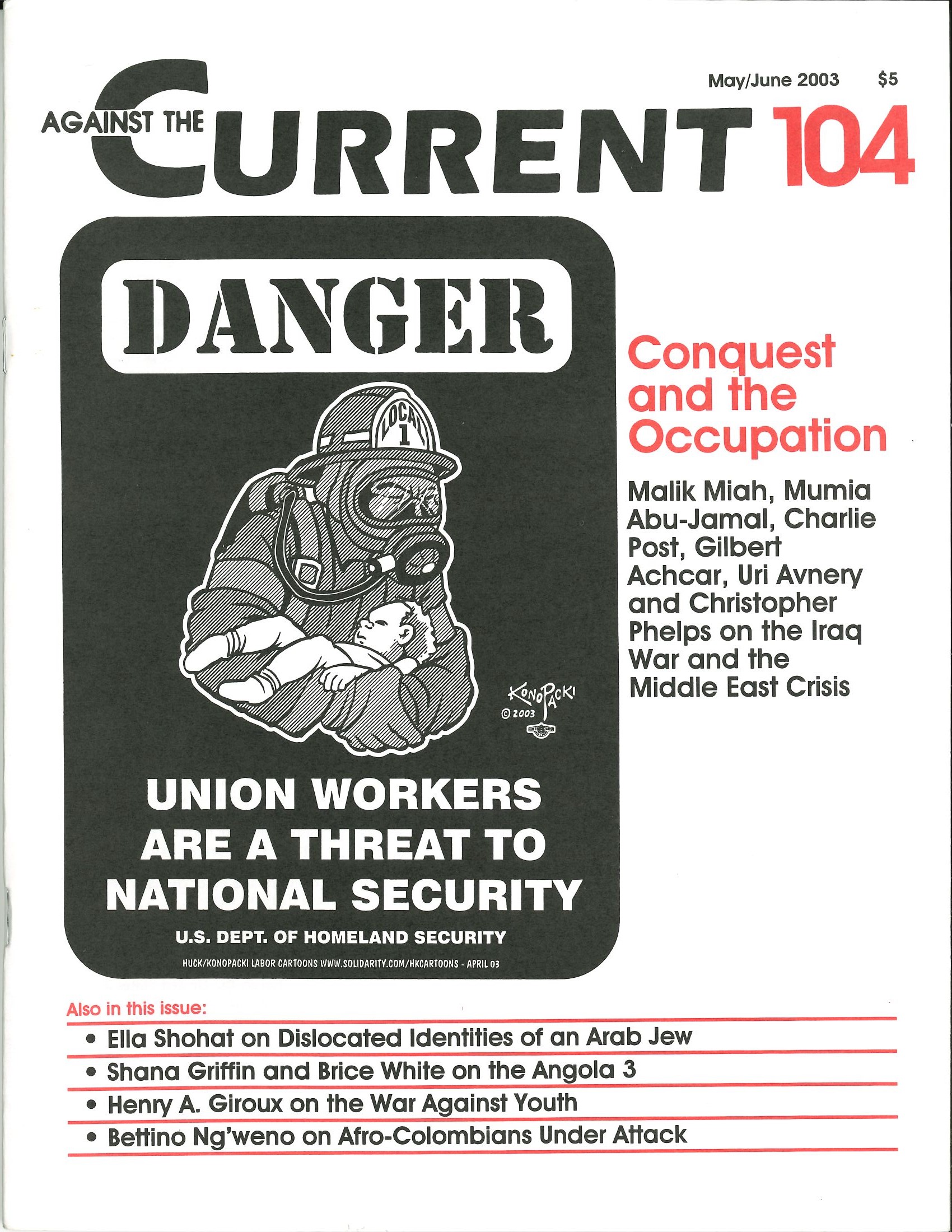Against the Current, No. 104, May/June 2003
-
Occupation and the Empire
— The Editors -
After Thirty-one Years, Free the Angola 3!
— Shana Griffin and Brice White -
The Assault on the Young
— Henry A. Giroux -
GABRIELA: Let Women's Voices Be Heard
— Jeanette Heinrichs -
Random Shots: That Was the War That Was
— R.F. Kampfer - In the Wake of the War
-
Black America and the Iraq War
— Malik Miah -
The Battle for Empire
— Mumia Abu-Jamal -
Who Gets the Spoils of War?
— Charlie Post -
Don't Let the B2s Get You Down
— Gilbert Achcar -
Bush's Road Map to Nowhere
— Uri Avnery -
Reflections of an Arab Jew
— Ella Habiba Shohat -
The War and the Rubble
— Christopher Phelps - The Latin American Cauldron
-
On the Rise of Lula
— Francisco T. Sobrino -
The Argentine Crisis, Part II
— James Cockcroft -
Afro-Colombians Under Attack
— Bettina Ng'weno - Reviews
-
Remembering When Hollywood Was Radical
— Paula Rabinowitz -
Putting Democracy on Hold in Mexico
— Dan La Botz -
Life and Laughter of Covington Hall
— Matthew Quest - In Memoriam
-
Alexander Buchman's Revolutionary Life
— Susan Weissman -
Christopher Hill and the Recovery of History
— Ellen Meiksins Wood
Mumia Abu-Jamal
I believe that armies and navies are at bottom the tinsel and braggadocio of oppression and wrong, and I believe that the wicked conquest of weaker and darker nations by nations whiter and stronger but foreshadows the death of that strength . . . — W.E.B. DuBois, Darkwater (1920)
BY THE TIME this is read, the flames of Baghdad may be cold; the bombing may have faded into memory.
By the time these words are heard or read by others, the war in Iraq may indeed be over. In this age, with the naked power of the United States military, there is no telling. It may be so. But if so, it can only be said to be an end to one war; there is little serious question but that it is the beginning of other wars.
It may be the precursor of other imperial wars, with laser-guided targets training their cold, green metallic sights on North Korea, or Iran, or Syria, or . . . ?
It may be that the adventure in Iraq has sparked other wars against other Western targets.
What is virtually certain is that this is not a war to stop other wars (remember `World War II’? Our parents and grandparents foolishly called it `The War to End All Wars’ — uh huh), but a war that will make the waging of more wars far more certain, and far less containable.
Once more, an Arab people have been humiliated by the West, under the propaganda fig leaf of “human rights.” We are assured, by the voices in the Pentagon, as well as the White House and their sycophants in the media, that this is a “War of Liberation.” Any honest student of history can cite a half dozen examples of foreign nations claiming to invade another nation for their own good, to “liberate” them.
When the U.S. fought Spain for Cuba and Puerto Rico, they claimed the right to “liberate” it from Spanish cruelty. The U.S. wanted to make it into a colony in which to expand American slavery. Americans even supported an armed invasion of the island of Cuba, headed by a Cuban rebel and mercenary named Narciso Lopez, for whom they raised money and some 600 Americans (mostly Louisianans). Lopez and his supporters promised that at the time of the invasion a popular uprising would take place against the government. Lopez and his troops sailed to Cuba, and seized the town of Cardenas, burning the governor’s mansion. However, no uprising took place.
The Cubans apparently didn’t feel like being “liberated” by the American-backed Lopez, who, on the run from the Spanish Army, barely escaped. This was May 1850 (source: McPherson, James. Battle Cry of Freedom, 1988, 105).
Governments often offer up pretexts to cover the real reasons for war. Those who fight the wars, or even those who support the wars for patriotic reasons, rarely know the real reasons.
In this age of the Internet, and widening literacy, however, more and more people are able to pierce the veils of state propaganda, and therefore able to do the historical and economic research to perceive the real reasons behind the Iraqi Adventure.
The safest site in all of Iraq is most certainly the areas around the oil fields of Rumaila. What does that tell you?
ATC 104, May-June 2003

